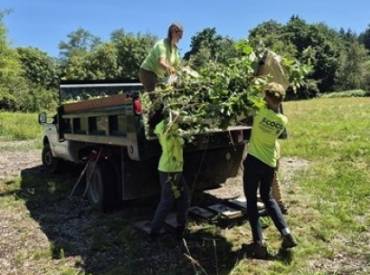
What the NRPA Diversity Scholarship Meant to Me, and Why It Matters
By Gaby Bridges, CPRP, MPA | Posted on February 12, 2026
Gaby Bridges, the recreation and special events supervisor for City of Layton, Utah, shares her experience as a former NRPA Diversity Scholarship recipient.

Table Tennis and Where Generations Meet
By Clement Lau, DPPD, FAICP | Posted on February 9, 2026
A single table tennis table can activate a community room, a park pavilion, or a corner of a recreation center.

The Power of Mentorship in Macon-Bibb County, Georgia — Episode 174
By Cort Jones and Christina High | Posted on January 27, 2026
On the latest episode of Open Space Radio, we're celebrating National Mentoring Month with JaCory Bazell, CPRP, CYSA, CPO, the center supervisor at Bloomfield-Gilead Recreation Center in Macon-Bibb County, Georgia, and Olivia Peterson, a program manager at NRPA.

The Quiet Work of Leadership
By Clement Lau, DPPD, FAICP | Posted on January 12, 2026
The quiet work of leadership does not always draw attention, but it shapes decisions, relationships and outcomes in lasting ways. In fields devoted to shared spaces, public service and community well-being, recognizing and making room for quieter leadership is essential.

The Reciprocal Benefits of Mentorship in Bainbridge Island
By Sierra Cross | Posted on January 7, 2026
Through developing lasting relationships with students, Student Conservation Corps staff help students succeed in and out of Bainbridge Island Metro Parks.

The Playground Protected: How LWCF Preserves New Hampshire's Outdoor Adventures
By Kaitlyn Brodie | Posted on December 19, 2025
What happens when the Land and Water Conservation Fund and advocacy groups come together to protect forest-based industries and support the local outdoor recreation economy? New Hampshire’s White Mountain National Forest serves as the perfect example.

Honoring Native American Heritage Month — Episode 173
By Christina High and Cort Jones | Posted on November 25, 2025
On this episode of Open Space Radio, we reshare a conversation with Sara Sinclair and Stephanie Lozano filled with powerful history, examples of actions we can take, and the importance of leading with curiosity and humility.

“Environmentally-Friendly Park Management” Published by Sasaki and the National Recreation and Park Association (NRPA)
By Chris Hardy | Posted on November 20, 2025
“Environmentally-Friendly Park Management” is a guide that helps park and recreation agencies achieve their sustainability goals.

NRPA Tracking Impacts of Federal Shutdown
By Kyle Simpson | Posted on November 13, 2025
On November 12, Congress passed a stopgap spending package that officially ended the 44-day government shutdown — the longest in U.S. history.

Stronger Together: How NRPA and Bchex Elevate Park Safety
By Emma Baucom | Posted on November 4, 2025
Learn how NRPA members can get access to streamlined background screening tools tailored specifically to the recreation field.

An Open Space Radio Halloween: Spine-Chilling Tales from Parks and Recreation — Episode 172
By Cort Jones, Christina High, Cara Myers | Posted on October 28, 2025
Halloween is here, and Open Space Radio is celebrating with one of our most hauntingly fun episodes yet. In this special episode, we sit around the virtual campfire to share a few eerie tales from park and recreation professionals.

Celebrating the Heart of Youth Sports: Coach Appreciation Month
By Brian McFadden | Posted on October 22, 2025
Every October, Coach Appreciation Month gives us a chance to pause and honor the individuals who dedicate their time, energy and heart to shaping the next generation through sports.

Record Year for Seventh Annual Parks for Pollinators BioBlitz
By Rukmini Kalamangalam | Posted on October 21, 2025
In September, 120 organizations — from zoos and museums to local and state parks departments — came together to observe and document the incredible species that thrive in our parks through NRPA’s Parks for Pollinators BioBlitz.

Honoring Dr. Jane Goodall’s Legacy Through Parks
By Clement Lau | Posted on October 15, 2025
Dr. Jane Goodall's passing on October 1 at the age of 91 is a tremendous loss. Yet for all of us who care about parks, conservation and sustainability, her legacy continues to guide and motivate our work.

Level Up With Skill Builders — NRPA’s Newest Learning Opportunities
By Elyse Quinn | Posted on October 8, 2025
Designed directly from NRPA member feedback, Skill Builders offer quick, actionable learning that fits your schedule and budget.

Flowing Forward: LWCF’s Role in South Carolina’s Newest State Park
By Kaitlyn Brodie | Posted on October 6, 2025
This year has been especially transformative for the Black River as the South Carolina Department of Parks, Recreation and Tourism (SCPRT) received LWCF funding to acquire land around the river in May, and Black River State Park was established in January.

What Is a Training Grant and Why Should I Apply?
By Colleen Pittard | Posted on October 6, 2025
Training grants are grants that do not always provide funds, but instead provide training, coaching and technical assistance. Since 2016, NRPA has been offering instructor training grants for evidenced-based physical activity programs and we just opened applications for another round!

Stronger Together: Lessons in Partnership and Sustainability in Charles County, Maryland
By Steph Whyte | Posted on September 24, 2025
Like many park and recreation agencies, Charles County doesn’t have a horticulturist or sustainability expert on staff to inform where and what to plant or mow. Their success wasn’t about having ample capacity in-house; it was about partnering differently.


